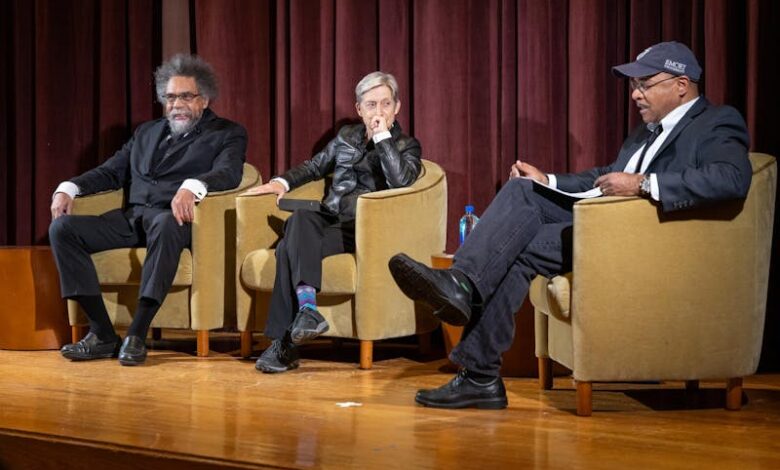Cornel West, Judith Butler visit Emory for a ‘candid conversation’ about politics, philosophy

Two of the most famous living philosophers, Cornel West and Judith Butler, came to Emory University on Oct. 29 for a “Candid Conversation,” hosted by Samuel Candler Dobbs Professor of Philosophy George Yancy. Community members eagerly gathered in the Harland Cinema inside the Alumni Memorial University Center as they discussed the intersection of contemporary politics and philosophy.
Butler is a philosopher in feminist and gender theory, having written texts such as “Gender Trouble” (1990) and “Who’s Afraid of Gender?” (2024). West is the Dietrich Bonhoeffer Professor of Philosophy and Christian Practice at Union Theological Seminary and ran for president in 2024. West’s work focuses on the intersections of African American critical thought and the humanities.
Butler began the talk by sharing how they became interested in philosophy. When Butler was younger, they would go to the basement in their home after fights with their mother. There, they found old collections of philosophical texts like Baruch Spinoza’s “Ethics” (1677) and Søren Kierkegaard’s “Either/Or” (1843). Butler emphasized the transformative effect these texts had on her life.
“I forgot about what was happening upstairs, and I didn’t hear the noises,” Butler said. “I didn’t hear anything. I was uninterruptible, radically.”
West called his own turn to philosophy a spiritual calling that he hopes to use to help others.
“[I] try to use those gifts in such a way that it facilitates that kind of love and freedom and healing and joy that no fascism can ever take away,” West said.
When the conversation turned to the state of American politics, West said that U.S. President Donald Trump, whom he called a fascist, is not the sole problem of the national shift toward right-wing politics, but a symptom of a bigger issue.
“He’s not the cause,” West said. “He’s just a sign and a symptom of a sick empire.”
Butler built off West’s critique, describing how they think Trump’s policies attempt to dismantle self-determination at every level, especially for those who identify as gender non-conforming.
“Your capacity for self-naming is being undermined,” Butler said. “You will have to, if he gets his way, take your gender off all legal documents. You will have to forfeit operating in legal and public settings as the gender that you are.”
While both Butler and West condemned the rise of right-wing authoritarianism, Butler also warned the Democratic Party not to abandon marginalized groups to win elections.
“There is no population that may be sacrificed for a Democratic win without the absolute defeat of the Democratic Party, as a place where we might look for direction, for soul, for goodness, for justice,” Butler said.
The conversation then turned toward international politics, particularly the ongoing conflict in the Middle East. Butler emphasized that even though there is a ceasefire in place, Israeli Forces are still carrying out military actions in Gaza on Oct. 29.
The Israeli government restarted bombings of Gaza after alleging that Hamas had violated the ceasefire by not returning the bodies of dead hostages. Hamas has said that finding the bodies of dead hostages has been difficult due to the level of destruction in Gaza.
West said that people are being hypocritical in their reaction to the treatment of Palestinian and Israeli people throughout the war.
“The Palestinian baby has exactly the same value as a Jewish-Israeli baby,” West said. “We should be responding to genocide, ethnic cleansing and apartheid-like rule over Palestinians in the same level of moral intensity that we would if there were a Palestinian occupation of the Jewish people.”
Butler emphasized that joy is the foundation of resilience during despair. They noted that the actions of the Trump administration could not take away true happiness.
“They can’t take this away,” Butler said. “They can’t take this joy away. No fascism can take this joy away.”
Building on Butler’s reflection, West expanded the conversation to include the role of laughter and compassion in sustaining the human spirit.
“You need mercy, you need love, but you also need a sense of the comic,” West said. “The comic is even deeper than the humor: You got the wit for the mind, cerebral, add a little love, you get humor. That’s comic.”
Ava Sandstrom (27C) said the emphasis on joy throughout the event stood out to her.
“There’s always a lot of discussion about the suffering that is the legacy of colonialism and racism and all of the systems that are so deeply entrenched within each other,” Sandstorm said. “They’re realizing themselves in the political climate of our country right now and yet, here was just such an energy of growth that both Dr. West and Dr. Butler brought that emphasized joy.”
Sandstrom also mentioned how the event created a space of solidarity among attendees.
“I feel emotionally and spiritually and intellectually connected to the space that they created, more than I ever have before,” Sandstorm said.
Santiago Gomez (28C) said the event helped him understand the challenges of critically engaging with today’s issues.
“I wanted to listen to a space where frank and truthful conversations can happen in a way that helps students and faculty understand better and make sense of the current times,” Gomez said.
Yancy shared that he planned the event to create a space for students to hear philosophers discuss and share their ideas about current events.
“The idea came from my desire to create a space, to create a context within which I could engage in conversation with prominent philosophers, or even prominent thinkers, intellectuals, to explore contemporary issues, and to do so with frankness and courage,” Yancy said.
Yancy emphasized that the event highlighted the importance of philosophy during times of political instability.
“Philosophy absolutely matters,” Yancy said. “It has always mattered, but particularly matters at this moment in American history where critical thought, critical intelligence and forms of resistance and forms of truth-telling is so incredibly important.”
Yancy added that he wanted the event to open students’ eyes to how they can use their education to transform their lives.
“I hope that they will function as forms of agitation that will create a space within which students will come to value education, not as simply something where one pursues to get money, but where one pursues to actually transform their souls,” Yancy said.
Credit: Source link






